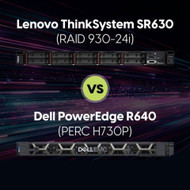Lenovo ThinkSystem SR630 (RAID 930-24i) vs. Dell PowerEdge R640 (PERC H730P)
Sep 2nd 2025
Quick Verdict
If you’re building a high-IOPS SAS/SATA box for databases, multiplayer/game servers, or compact cloud nodes, the SR630 with the RAID 930-24i is the stronger choice. You get a beefier RAID controller (more lanes, larger cache options, faster rebuilds) and excellent throughput density in 1U—without paying for features you won’t use.
Why the SR630 Build Wins
- Stronger RAID engine: Lenovo’s RAID 930-24i (12 Gb/s SAS) offers up to 4–8 GB of flash-backed cache and 24 internal SAS lanes, enabling higher queue depth and lower latency under heavy writes. Dell’s PERC H730P is solid, but typically caps at 2 GB NV cache and fewer internal lanes—meaning earlier contention when you scale spindles/SSDs.
- Faster rebuilds, steadier performance: More lanes + larger cache = shorter RAID5/6 rebuild windows and smoother latency while the array is busy (crucial for OLTP databases and real-time game worlds).
- Drive fan-out headroom: Even in 10×2.5" SFF configs, the 930-24i’s 24-port design avoids bottlenecks at the controller—great for mixed SSD/HDD pools, tiered storage, and future bay expansions.
Spec-for-Spec Highlights (SAS/SATA only)
| Category | Lenovo SR630 + RAID 930-24i | Dell R640 + PERC H730P |
|---|---|---|
| Form factor | 1U, 10× 2.5" SFF (SAS/SATA) | 1U, up to 10× 2.5" SFF (SAS/SATA) |
| CPU / Memory | Dual Intel® Xeon® Scalable; high-capacity DDR4 ECC | Dual Intel® Xeon® Scalable; high-capacity DDR4 ECC |
| RAID cache | Up to 4–8 GB flash-backed | ~2 GB NV cache |
| Internal SAS lanes | 24-port 12 Gb/s | Fewer internal ports (12 Gb/s) |
| RAID levels | 0/1/10/5/50/6/60 (hardware) | 0/1/10/5/50/6/60 (hardware) |
| Performance posture | Higher queue depth, better write buffering, faster rebuilds | Strong baseline, less headroom under heavy mixed IO |
Both are excellent 1U platforms, but the 930-24i’s lane count and larger cache give the SR630 a tangible edge in throughput consistency and rebuild behavior on SAS/SATA arrays.
Recommended Use Cases (SAS/SATA builds)
- Database servers (OLTP/OLAP): The SR630’s 930-24i sustains lower write latency during checkpoints, index rebuilds, and heavy parallel transactions. Great for MySQL/MariaDB, PostgreSQL, SQL Server.
- Gaming servers: Predictable tick rates and stable frame/world state writes during peak player counts; quicker recovery if a drive fails mid-event.
- Cloud/virtualization nodes: Better multi-VM IO isolation on shared SAS backplanes; faster parity rebuilds reduce degraded-state exposure windows.
- File/backup targets: High parallel streams with fast cache-assisted sequential and random IO.
Plain-English Takeaway
If you’re staying SAS/SATA-only, the SR630 + 930-24i combo is simply better equipped for heavy writes, parallel IO, and fast recovery—all the stuff that keeps databases snappy, game servers smooth, and cloud nodes dependable. The R640 + H730P is capable, but the SR630’s RAID muscle gives it the performance and resilience advantage in this class.

